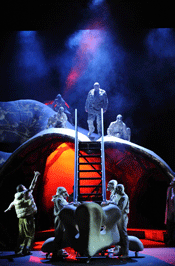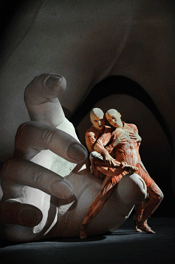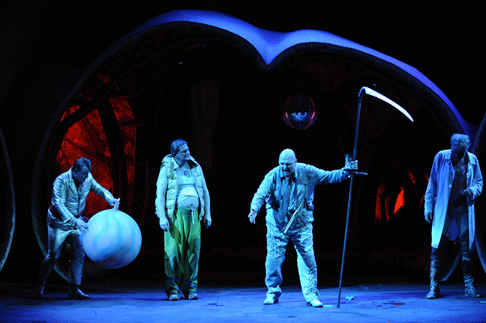Recently in Reviews
English Touring Opera are delighted to announce a season of lyric monodramas to tour nationally from October to December. The season features music for solo singer and piano by Argento, Britten, Tippett and Shostakovich with a bold and inventive approach to making opera during social distancing.
This tenth of ten Live from London concerts was in fact a recorded live performance from California. It was no less enjoyable for that, and it was also uplifting to learn that this wasn’t in fact the ‘last’ LfL event that we will be able to enjoy, courtesy of VOCES8 and their fellow vocal ensembles (more below …).
Ever since Wigmore Hall announced their superb series of autumn concerts, all streamed live and available free of charge, I’d been looking forward to this song recital by Ian Bostridge and Imogen Cooper.
The Sixteen continues its exploration of Henry Purcell’s Welcome Songs for Charles II. As with Robert King’s pioneering Purcell series begun over thirty years ago for Hyperion, Harry Christophers is recording two Welcome Songs per disc.
Although Stile Antico’s programme article for their Live from London recital introduced their selection from the many treasures of the English Renaissance in the context of the theological debates and upheavals of the Tudor and Elizabethan years, their performance was more evocative of private chamber music than of public liturgy.
In February this year, Albanian soprano Ermonela Jaho made a highly lauded debut recital at Wigmore Hall - a concert which both celebrated Opera Rara’s 50th anniversary and honoured the career of the Italian soprano Rosina Storchio (1872-1945), the star of verismo who created the title roles in Leoncavallo’s La bohème and Zazà, Mascagni’s Lodoletta and Puccini’s Madama Butterfly.
Evidently, face masks don’t stifle appreciative “Bravo!”s. And, reducing audience numbers doesn’t lower the volume of such acclamations. For, the audience at Wigmore Hall gave soprano Elizabeth Llewellyn and pianist Simon Lepper a greatly deserved warm reception and hearty response following this lunchtime recital of late-Romantic song.
Collapsology. Or, perhaps we should use the French word ‘Collapsologie’ because this is a transdisciplinary idea pretty much advocated by a series of French theorists - and apparently, mostly French theorists. It in essence focuses on the imminent collapse of modern society and all its layers - a series of escalating crises on a global scale: environmental, economic, geopolitical, governmental; the list is extensive.
For this week’s Live from London vocal recital we moved from the home of VOCES8, St Anne and St Agnes in the City of London, to Kings Place, where The Sixteen - who have been associate artists at the venue for some time - presented a programme of music and words bound together by the theme of ‘reflection’.
'Such is your divine Disposation that both you excellently understand, and royally entertaine the Exercise of Musicke.’
Amongst an avalanche of new Mahler recordings appearing at the moment (Das Lied von der Erde seems to be the most favoured, with three) this 1991 Mahler Second from the 2nd Kassel MahlerFest is one of the more interesting releases.
‘And there was war in heaven: Michael and his angels fought against the dragon; and the dragon fought and his angels, And prevailed not; neither was their place found any more in heaven … that old serpent … Satan, which deceiveth the whole world: he was cast out into the earth, and his angels were cast out with him.’
If there is one myth, it seems believed by some people today, that probably needs shattering it is that post-war recordings or performances of Wagner operas were always of exceptional quality. This 1949 Hamburg Tristan und Isolde is one of those recordings - though quite who is to blame for its many problems takes quite some unearthing.
There was never any doubt that the fifth of the twelve Met Stars Live in Concert broadcasts was going to be a palpably intense and vivid event, as well as a musically stunning and theatrically enervating experience.
‘Love’ was the theme for this Live from London performance by Apollo5. Given the complexity and diversity of that human emotion, and Apollo5’s reputation for versatility and diverse repertoire, ranging from Renaissance choral music to jazz, from contemporary classical works to popular song, it was no surprise that their programme spanned 500 years and several musical styles.
The Academy of St Martin in the Fields have titled their autumn series of eight concerts - which are taking place at 5pm and 7.30pm on two Saturdays each month at their home venue in Trafalgar Square, and being filmed for streaming the following Thursday - ‘re:connect’.
The London Symphony Orchestra opened their Autumn 2020 season with a homage to Oliver Knussen, who died at the age of 66 in July 2018. The programme traced a national musical lineage through the twentieth century, from Britten to Knussen, on to Mark-Anthony Turnage, and entwining the LSO and Rattle too.
With the Live from London digital vocal festival entering the second half of the series, the festival’s host, VOCES8, returned to their home at St Annes and St Agnes in the City of London to present a sequence of ‘Choral Dances’ - vocal music inspired by dance, embracing diverse genres from the Renaissance madrigal to swing jazz.
Just a few unison string wriggles from the opening of Mozart’s overture to Le nozze di Figaro are enough to make any opera-lover perch on the edge of their seat, in excited anticipation of the drama in music to come, so there could be no other curtain-raiser for this Gala Concert at the Royal Opera House, the latest instalment from ‘their House’ to ‘our houses’.
"Before the ending of the day, creator of all things, we pray that, with your accustomed mercy, you may watch over us."
Reviews

20 Sep 2009
Humour and horror — Ligeti's Le Grand Macabre at the ENO, London
A massive female figure fills the whole stage at the ENO for Ligeti's Le Grand Macabre, in this amazing production from La Fura del Bas. (Alex Ollé). This production is so inherently dramatic that it brings Ligeti's "anti-opera" onto a new level as theatre.art. .
The giant woman is a miracle of motors and pulleys, engineering transfigured as art. She’s obviously not alive, but she moves, following the action. She takes on whatever is projected onto her, changing with light from woman to man, aging, decaying, turning into a skull. She’s solid enough to support actors crawling over her yet seems to disappear into starlight or clouds when the lighting’s right. Her body opens to reveal secret caverns. She’s so wonderful, you’re mesmerized.
“A dress rehearsal for the end of the world” wrote Michel de Ghelderode whose original play inspired Ligeti’s “anti-opera”. Le Grand Macabre is an apocalyptic vision after Heironymous Bosch, Theatre of the Absurd at its most picaresque. Nothing is supposed to make sense, all logic overturned. So lovers Amando and Amanda (Frances Bourne and Rebecca Bottone, both women) wear their muscles outside their skin. Nekrotzar, note the nameplay, (Pavlo Hunka) is the all powerful figure of Death, who rides a plastic bubble horse while wielding a scythe.
 Rebecca Bottone (Amanda) and Frances Bourne (Amando)
Rebecca Bottone (Amanda) and Frances Bourne (Amando)
There’s lots of action, for this is Breughelland, teeming with busy figures. Venus (Susanna Andersson) slides down from the ceiling, and later appears as singing stormtrooper. Lots of deliberately unerotic sexual shennanigans - Astramodars (Frode Olsen) and his wife Mescalina (Susan Bickley), she of the conical size ZZ bra cups. The Black Minister (Simon Butteries) and The White Minister (Daniel Norman) exchange playground obscenities in alphabetical order. Piet the Pot ((Wolfgang Ablinger-Sperrhacke) is a down to earth drunk. Prince Go-Go (Andrew Watts, the countertenor) portrays a sad Elvis impersonator, his naivety no match for the evil plotters around him. There’s even a recreation of Michael Jackson’s *Thriller *dance routine to keep the chorus and actors on their toes.
It’s wildly madcap, lots of fun if taken on its own terms. Judging by the laughter most of this audience got the right mood. But the difficulty with Le Grand Macabre, is that it’s not easy to marry humour with horror. Some of Ligeti’s jokes are pretty asinine anyway, without the saving grace of shock, but there’s a lot more darkness and despair in his music than this production dwells on. On the other hand, human nature being what it is chooses levity over grim surreality .
In the Second Act, where Ligeti writes longer musical passages without narrative, Baldur Brönimann got reasonably idiomatic playing from the orchestra. Nonetheless this isn’t Ligeti at his most subtle, and most of the audience were there for the show not the music. Since this production had so much going for it that its sheer inventive energy was compensation for the relative lack of musical bite. Nothing to scare away Those Who Fear New Music. This production was so impressive that it will stick in the memory . For once, it will be good to listen to a recording (ideally Salonen) allowing La Fura del Bas’s incredible images come to life again in your imagination. You can hear the music again, but you’ll never see another production quite like this !
 Andrew Watts (Prince Go-Go), Wolfgang Ablinger - Sperrhacke (Piet the Pot), Pavlo Hunka (Nekrotzar) and Frode Olsen (Astradamors)
Andrew Watts (Prince Go-Go), Wolfgang Ablinger - Sperrhacke (Piet the Pot), Pavlo Hunka (Nekrotzar) and Frode Olsen (Astradamors)
Yet ultimately, Le Grand Macabre isn’t all that macabre. Death is overturned. Prince Go-Go is arrested because he isn’t dead. Piet, Astromodars and Mescalina, return to life and carry on as before. Nekrotzar is defeated and doesn’t come back. Instead he’s replaced by a shrunken puppet, inside the giant woman’s stomach. Then the giant’s features bloom again, colour returning to her cheeks, and she smiles. She’s remarkably realistic now, so it’s quite frightening seeing her eyeball to eyeball if you’re sitting upstairs. The giant woman’s face came from a film at the very beginning, where a sad, lonely woman seemed to be dying of a heart attack. She doesn’t die, but such a shambles of an existence is hardly life. It was uncomfortable seeing her “dead” body subject to indignities, but seeing the real actress who plays her in the film taking applause later wasn’t reassuring. Which is perhaps the point - we can’t assume everything’s back to normal, whatever normal “is”.
Ligeti’s Le Grand Macabre runs at the ENO until October 9th.
www.eno.org


